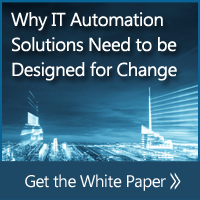The Economic Impact of Workload Automation
Attending the Gartner ITExpo means defining the economic and budgetary value that workload automation brings to the CIO and CTO.

Attending the Gartner ITExpo this week has presented the opportunity to demonstrate the value of workload automation to a different constituency group —C-level IT executives and upper management.
The conversation is fundamentally different from speaking to the system admins, application architects or developers we typically speak to at other tradeshows we’ve attended, such as Oracle OpenWorld, Informatica World and Microsoft Management Summit. It’s about understanding the business value that workload automation and enterprise job scheduling will bring to an IT organization.

That value represents the continuity, benefits and savings that having a single, enterprise-wide automation solution brings. IT environments have become increasingly distributed and complex and scheduling jobs at the machine level has become impractical and error-prone. Application and platform-specific scheduling solutions…Windows Task Scheduler, Cron, scheduling tools for virtual and cloud-based platforms or for applications like Informatica, SAP, Oracle and more…. place an operational burden and expense on an IT organization that limits its ability to easily and quickly automate processes that span today’s heterogeneous IT environments.
These “closed” scheduling solutions present a barrier to integrating business and IT operational workflows to streamline IT operations and increase flexibility and support for the business. Moreover, the inability to automate the management of resources and systems, both on-premise and cloud-based, to ensure that workflows are successfully executed and resources are “intelligently” provisioned and de-provisioned adds additional costs. Rather than provisioning server resources for peak demand – and paying the price for under-utilization during low workload demands – virtual and cloud computing, combined with workload automation, provides the ability to match workload execution with resource capacity in a “pay as you consume” model. That translates into hard dollars for an IT organization.
To overcome these boundaries, an enterprise IT automation solution can drive efficiency and reduce the cost of operations by providing IT organizations with a single scheduling and automation platform that spans both business and IT operational processes. Workload automation provides a single framework to bring all of your IT business process and IT operational automation requirements into a unified framework, including job scheduling, workload and runbook automation, self service automation and others to reduce the cost of IT operations, improve IT service levels and improve business agility and flexibility.








